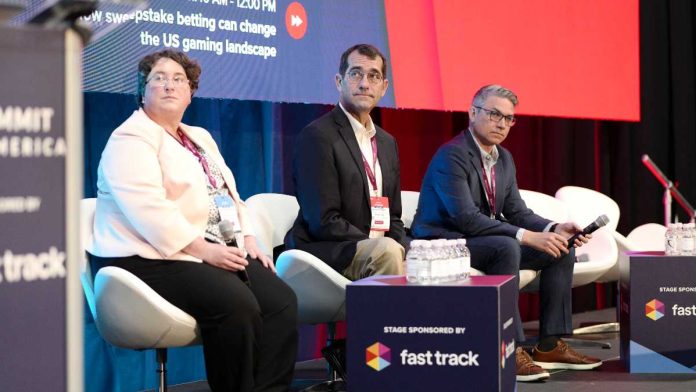If there is a common thread to the involved parties litigating what constitutes daily fantasy sports, it is that communication is paramount.
That was the recurring theme during a panel discussing “DFS 2.0” at this month’s SBC Summit North America event.
Attorney Daniel Wallach moderated a panel stacked with former and current regulators:
Ohio Casino Control Commission General Counsel Andromeda Morrison
Husch Blackwell Partner Derek Schmidt
Massachusetts Gaming Commission Deputy General Counsel Justin Stempeck
Vague definition of fantasy sports remains an issue
Part of the reason communication is so key is because, as Wallach noted, so much of the industry is rooted in very imprecise legal definitions.
“It seems like we have a little bit of a definitional problem as to what constitutes a fantasy sports contest and Congress did the industry no favors with what I consider to be a very imprecise four-part or five-part test that’s been interpreted to varying degrees to mean different things,” he noted.
Stempeck added that things only get more confusing when you consider the answer to what constitutes fantasy sports is really a state-by-state question. In many states, the definitions of fantasy were revised once sports betting was rolled out. In Ohio though, the lawmakers communicated with regulators to define and establish clear boundaries between fantasy sports and sports betting before any operations got up and running.
“In Ohio against the house offerings and proposition selection style offerings are specifically prohibited based on that guidance, and it’s, I think, worked well for the industry because those are lines of demarcation that we were able to put in place before any of the licensing was able to take place,” Morrison reflected.
Fantasy sports innovation outpacing DFS legislation
Schmidt, who served as the Attorney General of Kansas before moving to the private sector and representing the likes of PrizePicks, noted a big driver behind the lack of clarity is the fact that innovation in the fantasy industry is outpacing legislation and regulation.
“[Sports betting and fantasy sports] are both growing and maturing more rapidly than the regulatory framework is in most states. Where those lines get drawn is what everybody is really fighting about.”
The communication around those lines is getting increasingly complex too because of the differences across the verticals, namely age limits and other consumer protections.
“This is why regulators are going to be taking a really close look at trying to create those lines of demarcation because there are differences and there’s supposed to be differences between fantasy and sports gaming,” Morrison explained. “So when you talk about the difference between having a product available at 18 versus 21 When you have statewide exclusion programs versus just operator-based exclusion programs, the closer and closer that a company is getting into the sports gaming space, the more those consumer protection pieces start to get stretched thinner.”
What further complicates establishing which consumer protections are needed for each type of game is that there is a desire to future-proof some of these regulations as opposed to writing to a very specific moment in the industry’s growth.
“For large policy issues, particularly future-looking ones, it’s really critical to work closely with the legislators as well as regulators. So when that legislation is crafted, it’s not narrowly tailored to hit the current issue du jour,” said Stempeck.
When the Unlawful Internet Gambling Enforcement Act’s fantasy carveout was crafted in 2006, the idea of the roster-style DFS popularized by DraftKings and FanDuel in the early teens was not on lawmakers’ radar. Nor was the props-style fantasy product under scrutiny now when many states passed fantasy legislation catered to what was en vogue in 2014.
Success hinges on communication with regulators
As a result, fantasy operators are often keen to innovate but concerned they will run afoul of the regulators’ good graces.
Both Morrison and Stempeck said upstarts should start by reaching out to the regulators in states and seeing if they will speak with you. They also joked these informal conversations can be much cheaper than consulting with attorneys.
“It’s so much cheaper to set up a call with your regulator than to fill out an application and pay a fee that you may not get back,” Morrison noted.
While Massachusetts and Ohio have regulators that are open to have conversations, Schmidt did acknowledge that not every state has been communicative. Moreover, when it comes to states where fantasy is not regulated, it often falls to the state’s attorney general to determine how they feel about the products being offered.
As we’ve seen in Arizona and Massachusetts, where fantasy is regulated by the AG though, is that oftentimes regulators give the thumbs up to something and later change their minds.
“We’ve actually had a couple of states which are a little odd where we got the blessing of the regulators and a formal registration manner. We didn’t change anything. Games the same one they approved, operation periods within what they approved. And then the regulators say come talk to us again,” Schmidt said. “It kind of makes you wonder what’s going on in the marketplace, but that’s kind of another dynamic.”
Schmidt’s comments reiterate what the panel was saying all along though: Without solid communication, finding that balance between innovation and consumer protection, between fantasy sports and sports betting and between legal and illegal is far too difficult and complicated for any one group to answer on their own.














